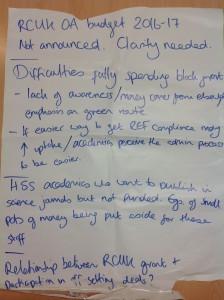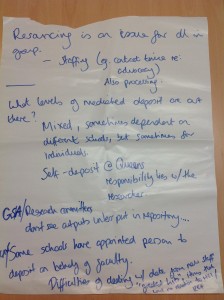The REF Open Access Planning workshop, which took place in Manchester in December 2015, was oversubscribed. This was quite disappointing for many of us who were in the process of setting up workflows in preparation for April 2016 and were keen to attend.
Our open access team here at Surrey was therefore delighted to receive a visit from Dominic Tate, Scholarly Communications Manager at the University of Edinburgh and project manager of Lessons in Open Access Compliance for Higher Education (LOCH), to offer advice and start a dialogue on open access and the REF. The visit took place in January, when we were still shaping our implementation plans.
The session was interactive, which allowed us to talk about how Surrey has been supporting open access in the last 10 years and what challenges we face in terms of embedding open access, managing workloads and reporting on compliance. Here are some of the key things we addressed:
Planning for the REF.
- Different models work for different Universities; but while there is no one-size fits all solution, exchanging ideas with others is always beneficial. Dominic put us in touch with nearby institutions with this in mind.
- It is important to keep the model simple. A ‘devolved’ or ‘centralised’ model – or a combination of both, can be chosen to fit the institution’s size, culture, and existing practices. Here at Surrey we are combining both approaches, identifying champions at School or research group level to help spread the messages, but also supporting a ‘top-down’ approach, e.g. emails from senior members of staff.
- It is important to create a really clear understanding of what is meant by ‘on acceptance’ and provide succinct guidance regarding this.
Staffing and workflows
- It is difficult to evaluate the FTE needed to work on Open Access if it is not yet fully embedded or adopted in the institution.
- Thinking about what tasks need extra resource is essential. We took this advice to put forward a business proposal for a specific workflow that we believed would work best for Surrey.
- It is worth considering the relatively low cost of Green OA in making a case for funding: this is approximately £33 to deposit a manuscript compared to £88 to pay an invoice – plus the invoice cost of approx. £1750 (based on SPARC figures). \this, too, has been very informative when putting forward a business case.
Changing Culture / key messages
- Having an open access policy in place, which Surrey has had for many years now, is only the first step towards implementation. A clear operational plan is necessary to implement the policy. In this respect Surrey has made a lot of progress, but this now needs to be aligned with HEFCE priorities.
- We need to start thinking about open access as part of the research lifecycle. If, for example, we treat open access like we treat research ethics, then it will become much harder for researchers to ignore.
- The emphasis should be on the added value of OA, rather than on compliance.
Four months after Dominic’s visit, and with REF compliance as our top priority, we have drawn considerably on that day’s discussions to:
- Formulate key messages around compliance;
- Plan, set up and start implementing a heavily mediated workflow for REF compliance, supported by advocacy available at many levels and through several communication channels;
- Make sure that key ideas around the value of open access are not lost among funders’ mandates, supporting systems and copyright jargon.
Surrey has been supporting open access since the setup of our first repository in 2005. GFollowing the introduction of HEFCE’s open access policy we have reviewed our practices, moving to more mediated procedures, and strengthened the messages with compliance in mind. Discussing this within the LOCH project context has helped us see more clearly what others have tried and what is most likely to work for our institution. Even more importantly, we have also addressed support of open access beyond compliance with HEFCE.
Posted on behalf of Christine Daoutis – University of Surrey

















Leave a Comment